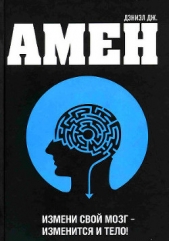Зрелый возраст

Зрелый возраст читать книгу онлайн
Наш мозг в зрелом возрасте не только не увядает, но и сохраняет способность учиться и развиваться — это доказанный современной наукой факт. Интересная, активная и здоровая старость, о которой мечтает каждый, сегодня вполне достижима. Практикующий психотерапевт Генри Эммонс и нейропсихолог Дэвид Олтер рассказывают об уникальных методах оздоровления мозга, упражнениях на остроту ума и о правилах, следуя которым вы будете встречать каждый новый день с радостью. Из книги вы узнаете: как физическая нагрузка влияет на здоровье мозга, эмоции и энергичность; как решать проблемы со сном; как правильное питание действуют на работу мозга; как настроить себя на позитивный лад и о многих других способах, которые позволят в преклонном возрасте быть активными и счастливыми.
Внимание! Книга может содержать контент только для совершеннолетних. Для несовершеннолетних чтение данного контента СТРОГО ЗАПРЕЩЕНО! Если в книге присутствует наличие пропаганды ЛГБТ и другого, запрещенного контента - просьба написать на почту [email protected] для удаления материала
128. http://www.greenmedinfo.com/article/alpha-lipoic-acid-anti-inflammatory-andneuroprotective-treatment-alzheimers.
129. J. Douillard, The 3-Season Diet (New York: Harmony Books, 2001).
130. M. Levine et al., “Low Protein Intake Is Associated with a Major Reduction in IGF-1, Cancer, and Overall Mortality in the 65 and Younger but Not Older Population,” Cell Metabolism 19. no. 3 (2014): 407-17, doi:10.1016/j. cmet.2014.02.006.
131. http://www.ewg.org foodnews/summary.php.
132. http://www.edf.org/sites/default/files/1980 pocket seafood selector.pdf.
133. S. Weyerer et al., “Current Alcohol Consumption and Its Relationship to Incident Dementia: Results from a 3-Year Follow-Up Study among Primary Care Attenders Aged 75 Years and Older,” Age Ageing 40 (2011): 456-63.
134. S. Sabia et al. “Alcohol Consumption and Cognitive Decline in Early Old Age,” Neurology 82 (2014): 332-39.
7. Любознательность — залог молодости мозга: шаг четвертый
135. J. Rodrigue et al., “Induced Mood and Curiosity,” Cognitive Therapy and Research 11, no. 1 (1987): 101-6.
136. J. Litman and T. Jimerson, “The Measurement of Curiosity as a Feeling of Deprivation,” Journal of Personality 82, no. 2 (2004): 147-57.
137. J.E. Joseph, X. Liu, Y. Jiang, D. Lynam, and T.H. Kelly, “Neural Correlates of Emotional Reactivity in Sensation Seeking,” Psychological Science 20, no. 2 (2008): 215-23.
138. M. Kang et al., “The Hunger for Knowledge: Neural Correlates of Curiosity” (manuscript), Division of Humanities and Social Sciences, California Institute of Technology.
139. T.B. Kashdan and M.F. Steger, “Curiosity and Pathways to Well-Being and Meaning in Life: Traits, States, and Everyday Behaviors,” Motivation and Emotion 31, no. 3 (2007), 159-73.
140. T.B. Kashdan and P.J. Silvia (2009), “Curiosity and Interest: The Benefits of Thriving on Novelty and Challenge,” in S.J. Lopez, ed., Handbook of Positive Psychology, 2nd ed. (New York: Oxford University Press).
141. D.C. Park and I. McDonough, “The Dynamic Aging Mind: Revelations from Functional Neuroimaging Research," Perspectives in Psychological Science 8 (2013): 62-67.
142. L. Shlain, Art & Physics: Parallel Visions in Space, Time and Light (New York: Harper Perennial, 1991).
143. Shlain, ibid., p. 16.
144. L. Carroll, Alice’s Adventures In Wonderland, chap. 1, “Down the Rabbit Hole” (New York: Bantam Dell, 1981; first published 1865).
145. W. Pisula et al., “Comparative Psychology as Unified Psychology: The Case of Curiosity and Other Novelty-Related Behavior,” Review of General Psychology 17. no. 2 (2013): 224-29.
146. J. Litman, “Curiosity and the Pleasures of Learning: Wanting and Liking New Information," Cognition and Emotion 19, no. 6 (2005): 793-814.
147. A. Gosline, “Bored to death: Chronically Bored People Exhibit Higher Risk-Taking Behavior,” Scientific American, Feb. 26,2007, www.sciam.com/article. cfm?id=bored — find-something-to-live-for.
148. C. Yamal and X. Qian, “Older-Adult Playfulness: An Innovative Construct and Measurement for Healthy Aging Research,” American Journal of Play 4, no. 1 (2011): 52-79.
149. Robert Frost, “The Road Not Taken” (poem). Mountain Interval (New York: Henry Holt, 1915).
8. Молодость мозга и гибкий ум: шаг пятый
150. Е. Goldberg, The Wisdom Paradox (New York: Gotham Books, 2005).
151. C. Herzog et al., “Enrichment Effects on Adult Cognitive Development,” Psychological Science in the Public Interest 9, no. 1 (2008): 1-65.
152. B. Chanowitz and E. Langer, “Premature Cognitive Commitment.” Journal of Personality and Social Psychology 41, no. 6 (1981): 51-63.
153. E. Langer, Mindfulness (New York: Da Capo Press, 1989).
154. C. Coppens et al. (2010). “Coping Styles and Behavioural Flexibility: Towards Underlying Mechanisms,” Philosophical Transactions of the Royal Society 365, no. 1560 (2015): 4021-28.
155. C. Coppens et al. (2010). “Coping Styles and Behavioural Flexibility: Towards Underlying Mechanisms,” Philosophical Transactions of the Royal Society 365, no. 1560 (2015): 4021-28.
156. D. Kahneman, Thinking, Fast and Slow (New York: Farrar, Straus and Giroux,
2011).
157. J. Hawley, The Bhagavad Gita: A Walkthroughfor Westerners (San Francisco: New World Library, 2001).
158. M. Merzenich, Soft-Wired, 2nd ed. (San Francisco: Parnassus Publishing, 2013).
159. D. Durstewitz et al. “Abrupt Transitions between Prefrontal Neural Ensemble States Accompany Behavioral Transitions during Rule Learning,” Neuron 66 (2010): 438-48.
160. S. Floresco, “Prefrontal Dopamine and Behavioral Flexibility,” Frontiers in Neuroscience 7, no. 62 (2013).
161. G. Buzsaki, Rhythms of the Brain (New York: Oxford University Press, 2006).
162. K. Druck, The Real Rules of Life: Balancing Life’s Terms with Your Own (New York: Hay House Publishing, 2012), p. vxi.
163. D. Zabelina and M. Beeman, “Short-Term Attentional Perseveration Associated with Real-Life Creative Achievement," Frontiers in Psychology 4 (2013): 191.
164. Там же.
165. A.S. Griffin, D. Guez, F. Lermite, and M. Patience, “Tracking Changing Environments: Innovators Are Fast, but Not Flexible Learners,” PLoS ONE8, no. 12 (2013): Є84907, doil0.1371/journal.pone.0084907.
166. P. Greenwood, Nurturing the Older Brain and Mind (Cambridge, MA: MIT Press,
2012).
167. J. Singer, Memories that Matter (Oakland, CA: New Harbinger Publications, 2005).
9. Молодость мозга и оптимизм: шаг шестой
168. D. Hecht, “The Neural Basis of Optimism and Pessimism.” Experimental Neurobiology 22, no. 3 (2013): 173-99.
169. A. Reading, Hope and Despair: How Perceptions of the Future Shape Human Behavior (Baltimore: The Johns Hopkins University Press, 2004), 3.
170. L. Abramson, M. Seligman, and J. Teasdale, “Learned Helplessness in Humans: Critique and Reformulation,” Journal of Abnormal Psychology 87, no. 1 (1978): 49-74.
171. T. Sharot et al., “Dopamine Enhances Expectation of Pleasure in Humans," Current Biology (2009), doi:10.1016/j.cub.2009.10.025.
172. T. Sharot, C. Korn, and R.J. Dolan, “How Unrealistic Optimism Is Maintained in the Face of Reality," Nature Neuroscience 14 (2011): 1475-79.
173. C. Moutsiana, N. Garrett, R.C. Clarke, R.B. Lotto, S.J. Blakemore, and T. Sharot, “Human Development of the Ability to Learn from Bad News, Proceedings of the National Academy of Sciences 110, no. 41 (2013): 16396-401.
174. R. Hanson and R. Mendius, Buddha's Brain: Practical Neuroscience of Happiness, Love and Wisdom (Oakland, CA: New Harbinger Publications, 2009).
175. C. Korn, T. Sharot, H. Walter, H.R. Heekeren, and R.J. Dolan, “Depression Is Related to an Absence of Optimistically Biased Belief Updating about Future Life Events,” Psychological Medicine 44 (2014): 579-92.
176. R. Chowdhury, T. Sharot, T. Wolfe, E. Diizel, and R.J. Dolan, “Optimistic Update Bias Increases in Older Age,” Psychological Medicine 4 (2013): 1-10.
177. M. Gallagher, S. Lopez, and S. Pressman, “Optimism Is Universal: Exploring the Presence and Benefits of Optimism in a Representative Sample of the World,” Journal of Personality 81, no. 5 (2013): 429-40.
178. R. Chowdhury, T. Sharot, T. Wolfe, E. Diizel, and R.J. Dolan, “Optimistic Update Bias Increases in Older Age.”
179. S.H. Kim, B. Cornwell, and S.E. Kim, “Individual Differences in Emotion Regulation and Hemispheric Metabolic Asymmetry,” Biological Psychology 89 (2012): 382-86.
























